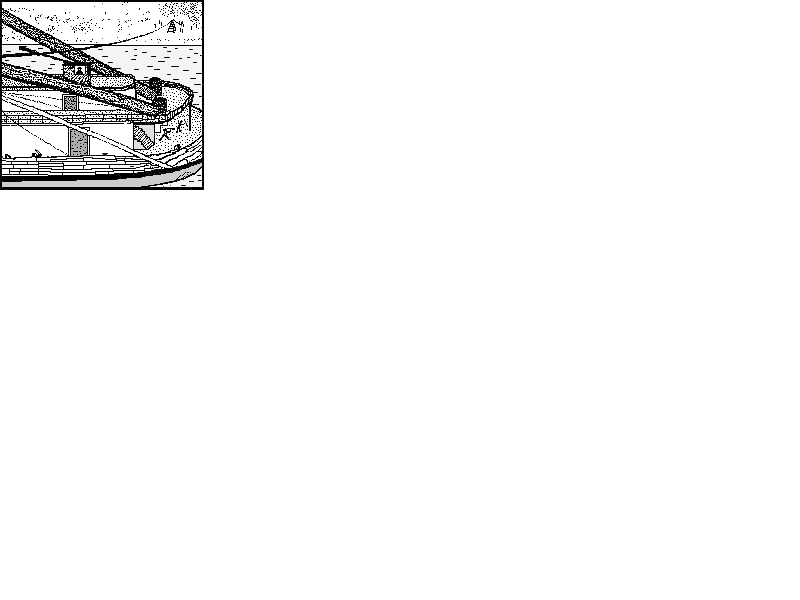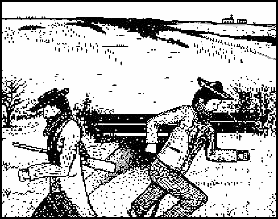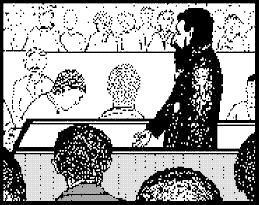








The Battle of Batoche:
Middleton decided to attack Batoche from two sides at the same time. He planned to have a boat sent down the river to Batoche where it would attack from the west. Meanwhile, Middleton would lead his soldiers in an attack from the East.
A steamer was prepared for battle by changing it into a gunboat. To provide protection from the Metis gunfire, they used boards from Dumont's house and barn, part of Dumont's pool table, and some feed sacks. Dumont's house was then looted and burned.
Thirty-five soldiers took up positions on the gunboat, and it started down the river towards Batoche.
As the gunboat neared Batoche, many of the Metis and Indians left their rifle pits and ran to the riverbank. There was an exchange of fire.
As the boat passed Batoche, the Metis lowered a ferry cable and the smokestacks, spars, and steam whistle were knocked over. The gunboat drifted out of control, on down the river. It did not return.

Middleton and his soldiers marched towards Batoche. They arrived an hour late, so the gunboat had already passed, and the Metis and Indians were back in their rifle pits.
Middleton had a field gun fire at the village of Batoche. The women and children fled in terror.
Middleton began to attack with his soldiers, but the Metis men were fairly safe in their rifle pits which had been carefully hidden in the bushes. Once again, Middleton's soldiers fought from higher ground where they were easy targets. At the end of the first day of fighting, Middleton believed he was losing
The next morning, Middleton decided to delay a major attack. His men needed a rest, and he hoped that the Metis defense would weaken with time. For the next two days, Middleton made use of his field guns and the Gatling gun, but he avoided a major attack. The Metis continued to use up their ammunition.
By the morning of the fourth day, some of the Metis had realized that the battle was hopeless, so they left. Many of the Metis that remained were old men. They were running out of bullets, so some were firing stones from their shotguns.
After another morning of light fighting, Middleton became upset with some of the soldiers for not engaging the Metis. He stomped away in anger and then rode back to camp for lunch.
The soldiers did want to fight and get the battle over with. They were tired of waiting, so they began their own attack. The Metis began to withdraw.

As the armies fought in the distance, a group of Metis in the town asked Riel to work a miracle. One of the Metis later described what happened. He said:
Riel sank to his knees and lifted his arms in the form of a cross. He spoke: 'All together, let us say three times, very loudly, "My God, have pity on us!"' Others fell to their knees and repeated the words. Riel continued: 'My God, stop those people, crush them.' He called two men to hold his arms up, as in the previous battle.
Meanwhile, Middleton was out to lunch. When Middleton and some of the soldiers in the camp heard the gunfire, they rushed to the battle scene. The attack had been poorly organized. Many of the Metis were able to escape to the safety of the bushes. Riel and Dumont also fled into the bushes.
Dumont later described his experiences in the bushes:
I went back to find my wife, and then I began looking about for scattered families whose tracks I followed. Not far from there, I found a group of women and children as well as a few men. My brother Elie had cut some hay to cover them. It was distressing to see these poor creatures laying in the hay like animals. Seeing the bare feet of the children, I made them a kind of shoe out of rawhide. The women appeared very brave.
I led my wife to another patch of woods, and set out to capture some horses. On the way, my attention was attracted by a white object which I twice called upon to answer; and it was when I threatened to shoot that I heard a voice say, 'It is us.' I approached and recognized Madame Vandal whose husband had been killed, and whose daughter she had carried this far on her back, because she was paralyzed, but the poor child was exhausted, and they had stopped there.
I went a little further, and I saw a Sioux horse and a Canadian stallion. I put my wife on the mare, and I led it to a clump of trees where we camped.
The next day, I went back to the river. I saw the houses at Batoche, with white flags flying from their roofs. I saw that everyone was surrendering.
When Dumont later dictated his account of the events, he stated that, "The balance sheet of these four days of desperate fighting was for us, three wounded and twelve dead." Dumont's totals were radically different from the totals that Middleton claimed. Middleton wrote that one-hundred and seventy-three Metis were wounded, and fifty-one were killed. It appears that both Dumont and Middleton were not very good at counting.
Dumont concluded his account with the following:
There were a couple of hundred horsemen looking for me in front while I was behind them. I hid myself in the woods during the night, and I watched them on the hill during the day.
On the third day, I acquainted my father with my plan to spend the summer harrying the police. He said to me, 'If you follow your idea of staying to kill people, you will be looked upon as a silly fool,' and he advised me to go across the border. I told him that I had always taken his advice, and that I wanted very much to follow it again, I told him I would leave if I didn't find Riel.
Ouellet led me to believe that [Riel] had already surrendered. When I saw I was the only one left, I made up my mind to take refuge in the territory of the United States.
Dumont also talked about the wound he received during the Battle of Duck Lake:
I suffered through the whole war, from Fish Creek to Batoche. When I arrived in the States, the wound started to bleed again. I tried to fix it myself. There was a cut two inches long and three-quarters of an inch deep, right on the top of my head. The doctors told me the main artery had been cut. I had many accidents right after the war. When I coughed hard it was like being hit over the head with a hammer, and many times I lost consciousness and fell.
About a year after reaching the safety of the United States, Dumont joined Buffalo Bill's Wild West Show. After that, thousands of people paid to see Dumont demonstrate his riding and shooting talents.
In 1886, the Canadian government declared a general amnesty. Eight years after the fighting, Dumont returned home where he spent his remaining years hunting and farming.
A few days after the Battle of Batoche, Riel gave himself up. He was put on trial for high treason and faced a possible sentence of death.
Towards the end of the trial, Riel was allowed to address the jury. He made a long and rambling speech.
After Riel finished, the lawyer for the crown addressed the jury and stated:
Armed rebellion means the sacrifice of innocent lives, it means the loss of fathers, brothers, sisters, parents, the destruction of many homes.
Next, the judge made his statement and asked, "Can such things be permitted?"
Now, the judge allowed Riel to speak. Riel stated:
One-seventh of the land was granted to the people, to the half-breeds of Manitoba. Bring to the half-breeds of the North-West the guarantee that a seventh of the lands will also be given to them. I said, 'What belongs to us ought to be ours.'

Riel then added: "It is difficult for a small population, as the half-breed population, to have their voices heard."
The Judge sentenced Riel to be hung by the neck until dead.
The Prime Minister refused to show mercy.
On November 16, 1885, the sentence was carried out.
Epilogue:
Middleton became a national hero and was knighted by the Queen. Later it was discovered that he had taken furs from an English Metis. The resulting scandal ruined his reputation, so he returned to England.
Eighteen Metis were sentenced to jail terms. A year later, the Canadian Government declared an amnesty.
The people of Quebec were angered by the hanging of Riel. On the day after the hanging, six-thousand people marched through the streets of Montreal. A few weeks later, fifty-thousand upset people gathered to hear speakers criticize the conservative government for the hanging of Riel.
Gradually, the powerful Quebec conservative party lost its strength. The Liberal party got into power. For the most part, the Liberals ran the Canadian government for decades to come.
Meanwhile, during the trial of Riel, the government had been working to provide the Metis with the land grants. They were able to provide the Saskatchewan Metis with all of their requested land grants by the end of 1887. Also, the government had the Metis river lots resurveyed. This was completed in 1889 and 1890.
Unfortunately, the Metis were not able to make good use of some of the land they were awarded, and they did not understand the long term value of it. White speculators took advantage of the Metis, bought their land grants, and made huge profits.
The rebellion created a major change in Canadian public opinion. After the rebellion, the public supported the government as it used public funds to resurvey the Metis land, to pay the five-million dollars that it cost to fight the war, and to loan more money to the railway so it could be completed.
to next section. (Opinions of the Foreign Press)